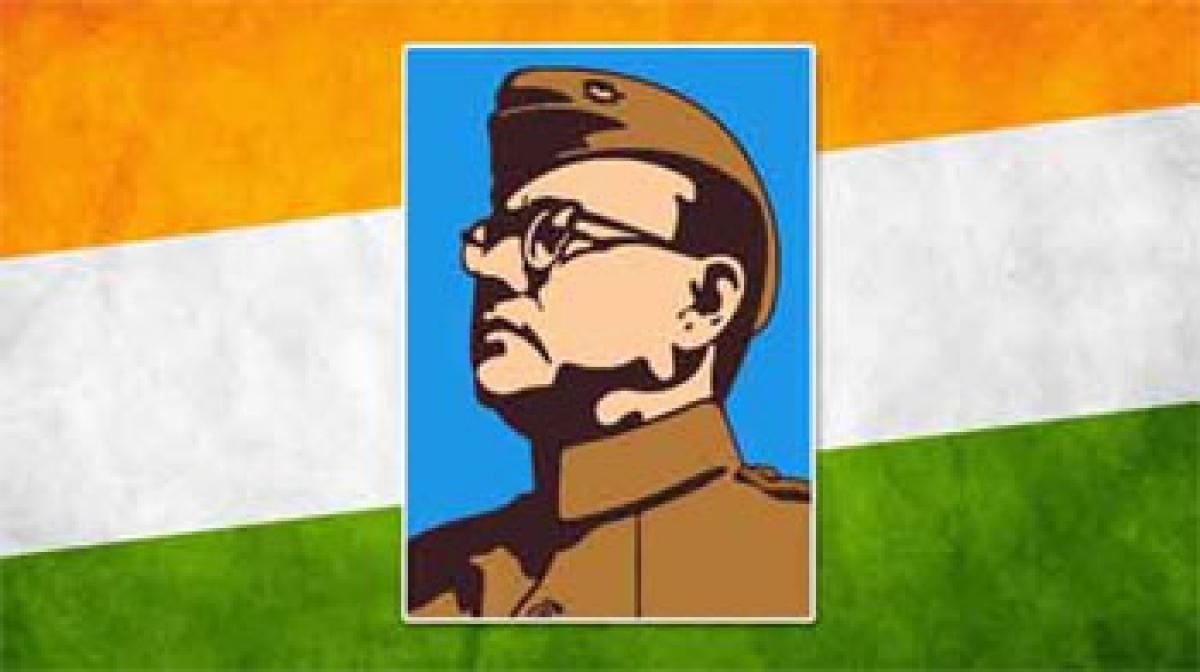Live
- Stokes motivates his team to put in extra effort, says England pacer Potts
- From overcoming setbacks to leading India in U19 Women’s Asia Cup, Niki Prasad's amazing journey
- Constitution debate: PM Modi hails 'Nari Shakti'; makes strong pitch for 'United Bharat’
- Bihar: Inquiry initiated against principal who went to buy veggies during school hours
- TN: DMK postpones executive meet due to heavy rains & Parliament session
- Porous silicon oxide electrodes can fix durability issues in batteries: Researchers
- Jalandhar civic polls: AAP promises launch of 100 e-buses, round the clock water supply
- Economic upliftment of rural women is priority of Tripura govt: CM Saha
- Rajmata Jijabai Trophy: Manipur move to top of the table, T.N register first win
- Italian envoy Baroli hoping to strengthen ties with India through football
Just In

She is as inquisitive as many others for a convincing answer to one of India\'s greatest mysteries-the disappearance of Netaji Subhas Chandra Bose. But nonagenarian INA veteran Aruna Chatterjee is equally aghast at the way the legendary revolutionary leader\'s name is being \"exploited\".
She is as inquisitive as many others for a convincing answer to one of India's greatest mysteries-the disappearance of Netaji Subhas Chandra Bose. But nonagenarian INA veteran Aruna Chatterjee is equally aghast at the way the legendary revolutionary leader's name is being "exploited".
Having fought for India's independence by taking up arms at the age of 16, Chatterjee is also disheartened to see her countrymen squabble over Netaji's death instead of celebrating his life and following his principles.
"Declassification of the secret files is certainly a welcome move. In fact, it was long overdue. But what is unacceptable is the way the issue has been and is being exploited for political mileage.
"I too have been advocating initiation of proper steps for solving the Netaji mystery. But what disheartens me is the way his name is being exploited for political gains, for commercial gains," the feeble, 90-year-old Chatterjee told IANS at her city residence.
While the Mamata Banerjee-led West Bengal government in 2015 declassified 64 files on Netaji, the Narendra Modi-led government, beginning this January, has made public a series of files revealing many sensational facts about the revolutionary.
"I have not gone through the files nor do I contest any of the claims. But there is one-upmanship going on; people are squabbling to impose what they believe. Why the focus on his death, why not on his life, the way he led the freedom movement," Chatterjee asked.
One of the many who believe that Netaji faked his death in the alleged 1945 plane crash in Formosa (now Taiwan) and escaped to Siberia, she asserts the central government should diligently pursue with foreign governments, particularly Russia, for declassifying secret files in their possession.
"From what I have heard, the Bengal or the central government files haven't yielded any conclusive evidence to establish what actually happened. Though it is now well established that he did not die in 1945, I think we need more serious efforts to get secret foreign files declassified.
"Interacting with former INA members and researchers, I believe he faked his death in the plane crash and escaped to Siberia. I think Russian government files hold the key," she said.
With the Uttar Pradesh government in June setting up a judicial commission to probe the identity of Gumnami Baba, reigniting the debate whether the ascetic who lived in the state's Faizabad district till 1985 was Netaji, Chatterjee, having seen Netaji from close quarters, says it's hard to believe the revolutionary would have preferred to live an incognito life.
"Going by what I have seen and know about him, I think it needed a very compelling reason for him to have lived the life of a hermit. However, if there is evidence indicating so, I think the probe panel is a good step," she said.
Born and brought up at Kamayut in Burma (Myanmar), Chatterjee, then a Class 8 student, joined the Rani Jhansi Regiment of the Indian National Army in 1944.
Even as she battles her feeble memory, Chatterjee insists she still vividly remembers her first encounter with Netaji during his durbar at a school in Kamayut in 1944.
"Addressing the people and the members of the Rani Jhansi regiment, Netaji asked if they can give their everything for the independence of their motherland. My mother holding my hand climbed atop the dais and handed over all the jewellery she had. Many others followed suit.
"Seeing women giving up their most precious possession moved Netaji. He couldn't hold on to his tears. I can never forget that sight," Chatterjee said.
But decades after India's independence, she can't help wondering if the India of today is the same country she had fought for.
"Today you see people killing each other over religion, there is so much hatred... at times I wonder if it is the same India that had countless people, men and women, young and old, leaving behind everything to fight for the motherland.
"How can people forget the sacrifices of countless people who gave up their life for India? People have forgotten Netaji's principles, his INA," Chatterjee lamented.
"It's sad to see youngsters these days don't know about my regiment, the brave girls of Rani Jhansi regiment who took up arms and fought valiantly for the country," a teary-eyed Chatterjee said.
Fond of writing, she penned a poem titled "Listen to my tale" reminding Indians about her regiment's exploits on the battlefield.
"All what is said is absolutely true/It all happened in Burma during World War two/ But woe to us that we failed our goal to obtain/Our army failed and in jail they were detained/Our supreme commander left the country/to where he went is still a mystery..." Chatterjee signed off, reciting a few lines of her poem.

© 2024 Hyderabad Media House Limited/The Hans India. All rights reserved. Powered by hocalwire.com







